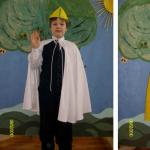Parent meeting in the form of the game “Happy Accident. Topic: “A fun conversation about naughty people and fidgets” (parent meeting in the form of a business game) Parent meeting based on the principle of a business game
Parent meeting in the form of the game “Lucky Chance”
Target: creating conditions for interaction and cooperation with parents by including them in interactive gaming activities
Tasks:
· hold a parent meeting in a non-traditional form - the form of a game;
· tell parents simple questions for conversations with children;
· Encourage parents to create and play with their own children using material from this collection;
· develop a sense of collectivism and cooperation among the parents;
· identify leaders among parents for subsequent coordination of work with the parent community;
· create a joyful atmosphere and cheer up parents;
· Strengthen the bond between parents and staff kindergarten.
Equipment: the name of the game from individual letters is “Lucky Accident”; team names and emblems; watercolor paints, brushes; cut pictures; cards with words; bell tokens.
Progress of the meeting
1. Opening remarks
Leading:
- Dear parents! We are glad to see you again here and now. Today we have an unusual meeting. We will conduct it in a playful way. Let's remember the good fairy tales of our childhood together. Will take part in the game two teams, each must choose a captain. The game consists of six competitions in which you will have to show your erudition, resourcefulness and ingenuity, and also earn winning points for your team. So, let's start our competition. I think that time will fly by, fun and beneficial for all of us.
2. Playing the game
Icompetition "Greetings"
Host: Our game begins with a greeting. So, the first “Greeting” competition.
You must collectively come up with a motto for your team and unanimously greet the opposing team.
The first team "Knowledge". For example, “We want to know everything.”
The second team is “Umniki”. For example, “The fact that we are here today is because of interest.”
(Greetings from the teams)
Host: Thanks to our teams. And now we move on to the next competition.
IIcompetition "Warm-up"
Presenter: Team captains are invited.
So that life doesn't seem sweet to you,
I'll tell you riddles!
He's floating on the sheet
Like a boat on the wave.
He is a good friend to housewives
Electric…. (IRON)
He's big, like a football
If it’s ripe, everyone is happy,
How pleasant it tastes
And his name is... (WATERMELON)
Leaned over the river
Their agreement is this:
The river will exchange for her
Perch on a worm... (FISHING ROD)
There's not a bird on the branch
The animal is small
The fur is warm like a hot water bottle
Who is this... (SQUIRREL)
Poor dolls are beaten and tormented,
He is looking for a magic key,
He looks terrible
This. (Doctor Aibolit - KARABAS-BARABAS)
He was on the road for many days
To find your wife,
And the ball helped the mind,
His name was... (Kolobok - IVAN TSAREVICH)
He is a big naughty man and a comedian,
He has a house on the roof,
Braggart and arrogant
And his name is... (Dunno - CARLSON)
He lived in Prostokvashino
And he was friends with Matroskin
He was a little simple-minded
The dog's name was... (Totoshka - BALL)
This beast sleeps in winter,
He looks awkward
Loves berries and honey
And it's called... (hippopotamus - BEAR)
Daughters and sons
Teaches you to grunt... (ant - PIG)
He sleeps in a hole during the long winter,
But the sun will start to warm up a little,
On the road for honey and raspberries
Departs... (BEAR)
He somehow lost his tail,
But the guests returned him.
He's grumpy like an old man
This sad... (Piglet – Donkey Eeyore)
Who flashes in the dense forest,
Does it have a red fur coat?
He knows a lot about chickens!
This beast is called (WOLF - FOX)
He walked through the forest boldly,
But the fox ate the hero.
The poor thing sang goodbye.
His name was... (Cheburashka - KOLOBOK)
Both beautiful and sweet
It's just too small!
Slender figure
And the name is .... (Snegurochka - ThUMbelina)
Host: Have a seat, dear captains, and we are starting the next competition.
IIIcompetition "Proverbs about friendship"
Each team receives a package with cut proverbs, which must be assembled into sentences.
Team #1:
Don't have a hundred rubles, but have a hundred friends.
If you don't have a friend, look for him, but if you find him, take care of him.
Team #2:
All for one, one for all.
Friendship is not a mushroom, you won’t find it in the forest.
Presenter: Well done! We completed the task.
And now the floor is given to our jury to sum up the results. first three competitions.
(Jury speech)
Host: Well, let's continue our game. The fourth competition is ahead, and all team members are participating.
IVcontest « Quiz about fairy boys and girls»
Host: In order to answer the quiz questions, you need to remember the heroes of fairy tales (questions are asked to the teams one by one).
Who defeated Koshchei the Immortal? (Ivan Tsarevich)
Which girl was born from a flower? (Thumbelina)
Who is the most “ interesting man at the dawn of strength” with a propeller behind your back? (Carlson)
Which girl blue hair? (Malvina)
Who lost the glass slipper at the ball? (Cinderella)
Which fairy tale hero loves to ride on the stove? (Emelya)
What is the name of the girl from the fairy tale? The Snow Queen"? (Gerda)
Who hired the priest for a job that paid three clicks on the forehead a year? (Bolda)
Who visited the Land of Lilliputians? (Gulliver)
Who visited the three bears? (Mashenka)
Who can ride a cannonball? (Baron Munchausen)
Which princess is the most tender princess in the world? (Princess on the Pea)
What boy lives in flower city and wears a big blue hat? (Dunno)
What is your name? good doctor? (Dr. Aibolit)
What is the onion boy's name? (Cipollino)
Who was held captive by Koschey the Immortal? (To Vasilisa the Wise)
Host: Thank you, dear parents!
Vcompetition "Draw"
And now we will draw together with you. The bravest mothers are invited to participate in the fifth competition. You will have to draw a cat blindfolded, following the description that I will read.
Draw a big circle
It's small at the top.
On the top of the head there are two ears,
This will be the head.
Draw for beauty
Give him a fuller mustache.
Here the fluffy tail is ready,
You are the most beautiful of all cats.
And now, dear parents, come up with a description of your cat, choosing the most tender and affectionate words.
(protection of drawings)
VIcompetition “Collect a picture”
Presenter: Pupils preschool group They love to collect puzzles. Let's see if mothers can collect cut-out pictures. The task is performed collectively, at speed.
3. Summing up
Leading: Before the jury sums up the results, we would like to thank everyone for participating in our game. It doesn't matter who won. And please, do not keep secret the knowledge that you received from your grandparents, fathers and mothers, from teachers at school, the knowledge that you acquired on your life’s journey - give it to your children so that they love their Motherland, loved and preserved its culture.
The jury is given the floor to sum up the results and announce the winners.
After summing up the results of the event, a collective tea party with pies is organized.
Aim of the meeting: contribute to the development of gender competence in parents.
Equipment: presentation, reminders with recommendations for education, pieces of paper for tests and wishes, pens, beautiful box for wishes, tasks with problematic situations.
The topic of our meeting is gender education. This expression can be heard quite often now. What does this word mean? “Gender” (gender), which denotes social sex, sex as a product of culture.
It has been established that it was during the period preschool childhood, all children living in different countries around the world, gender roles are being accepted: by the age of 2-3 years, children begin to understand that they are either a girl or a boy, and designate themselves accordingly; between the ages of 4 and 7 years, gender stability is formed: children become clear that “gender” does not change: boys become men, and girls become women, and this gender will not change depending on the situation or personal desires. Scientists believe that the formation of gender stability is determined by sociocultural norms and depends primarily on the attitude of adults towards the child, the character parental settings and attachment of both mother to child and child to mother.
The relevance of gender education is enormous; modern society is categorically against men and women having only a set of advantages based on their gender. Therefore, we adults should not forget that boys and girls (as well as men and women) are two different worlds, two different planets. But it so happened that in modern society The lines between professions and household responsibilities have blurred (the traditional role of the father has weakened and women’s employment has increased).
And now I suggest you simply answer the test questions for yourself.
So, briefly, (on a piece of paper) only “yes” or “no”:
1. Are girls more obedient than boys?
2. Do boys have a more analytical mind?
3. Are girls more fearful?
4. Are boys more active?
5. Are girls more easily influenced by others?
6. Are girls more sensitive to touch?
7. Are boys more aggressive than girls?
8. Are boys more ambitious than girls?
9. Do girls develop an inferiority complex more often?
10. Are boys more creative, and girls cope better with monotonous activities?
11. Do boys have a more developed tendency to command?
12. Are girls more willing to share their experiences?
Now compare your answers with the opinions of people professionally involved in child psychology:
1. No, only in early childhood do girls obey adults better.
2. No, the analytical mind is equally divided between the sexes.
3. No, girls more often complain that they are scared, but this does not affect their behavior.
4. No, there is no difference in early childhood; at school a lot depends on the class and teachers.
5. No, girls more often follow their own opinions, and boys adhere to the “rules of the game” accepted in the company.
6. No, there is no significant difference.
7. Yes, boys become aggressive from about 2.5 years old.
8. No, girls imagine their future achievements more vividly and clearly,
and boys have to be pushed to do this.
9. No, boys consider themselves stronger and are proud of it, but girls adapt better to different everyday situations.
10. No, boys and girls show the same abilities both when learning something and when solving unexpected problems.
11. No, boys tend to impose their demands on peers and even adults; girls achieve the same result gently and gradually.
12. Yes, but after 11-12 years, more early age the difference is small.
As you can see, we can conclude that boys and girls differently they look and see, listen and hear, they speak and are silent differently, they feel and experience, therefore they need to be raised differently.
Today, the loss of many progressive folk traditions led to the spiritual impoverishment of society, to a severance of the connection between times and generations.
But in a unique system developed over centuries public education, the gender competence of parents was formed easily and naturally.
It turns out that at birth, even the umbilical cord was cut differently for girls and boys. The girl's umbilical cord was cut with scissors over a spindle or on a comb, which symbolized endowing her with the qualities of a housewife and needlewoman. The boy's umbilical cord was cut with a knife so that he would be a good worker in the future.
The tradition of wrapping newborn girls in their father’s shirt and boys in their mother’s shirt is also of interest. Scientists believe that this is due to the programming of the unborn child. People dreamed that when their son grew up and got married, his wife would embody everything that was dear to him in his own mother, and the daughter would be able to see the features of her father in her chosen one. At the same time, it is obvious that this tradition contained a deep meaning in the transmission of gender roles, which on the female side carried tolerance, restraint, love and kindness, and on the male side - perseverance, courage, and responsibility.
Experience folk pedagogy indicates that even in infancy, children were raised taking into account their gender characteristics. So, for example, in lullabies, pestushki, nursery rhymes, games, there is an appeal not only to small child, and to girls and boys. Depending on who exactly the nursery rhyme or pester is addressed to, a girl or a boy, their future is predicted. Fathers took less part in raising infant children than mothers, but starting from the age of 3, they were actively involved in raising the child. For example, in peasant families, from the age of 3, children ate food at a common table. The girl was taken on her lap by the mother, and the boy by the father. And from that moment on, all responsibility for raising children fell on the shoulders of the parents: mothers were responsible for girls, and fathers were responsible for sons.
From girls and boys preschool age strict adherence to moral standards was required: respect for elders, caring attitude towards old people and younger children, kindness, responsiveness, politeness and discipline, diligence and honesty. The status of a woman-mother was especially significant. Its educational impact was recognized as so decisive that both positive and negative results education was attributed primarily to her.
The process of raising girls was in the hands of mothers, who were responsible for their behavior. In raising their daughters, the father acted more as an authority to which mothers referred. The father and other men of the family: grandfather, uncles, older brothers took full responsibility for their upbringing of preschool boys. The distribution of roles in a peasant family is also of interest. The father was given the main role in determining strategy and tactics family education, and the mother filled it with specific content and monitored its implementation, achieving results. The mother played with the child most often out of necessity, in order to distract, comfort or entertain him during the care process. The father and other men in the family specially organized games aimed at either physical development child or to develop his mental abilities, intelligence, and ingenuity.
We see that when raising children from the age of 3 in a peasant family, there is a clear distribution of upbringing responsibilities: girls - by mothers, and boys - by fathers. At the same time, the father comes to the fore, who, as it were, was responsible for imparting to children the skills of social behavior and instilling in them the norms of social life.
In the context of traditional family education, the key figures in raising children, taking into account their gender characteristics, are parents.
The potential of the family in shaping the personality of girls and boys of preschool age is limitless. It is parents, as people who are emotionally and spiritually close to girls and boys, who have the direct opportunity to develop and strengthen the personal qualities of each child, based on his individual characteristics. They, like no one else, know the features better early development your girl or your boy, the main symptoms of their ailments, the individual characteristics of the rhythm of life, since from the moment of birth they are next to them, “accompanying” their development.
Folk traditions are inseparably linked with folk art- these are fairy tales, riddles, proverbs, and sayings. Our people have many proverbs about family, family values. Which ones do you know?
It's warm in the sun, and good in mother's presence.
The whole family is together, and the soul is in place.
IN friendly family and warm in the cold.
A man without a family is like a tree without fruit.
What is a treasure for when there is harmony in the family?
There is no sweeter friend than your own mother.
And now I suggest you relax a little and unravel the proverbs - shifters.
You can improve the borscht with sour cream. (You can’t spoil porridge with oil.)
Chicken is a boar's friend. (The goose is not a friend to the pig.)
The policeman's felt boots are getting wet. (The thief’s hat is on fire.)
Not everyone is a locksmith for someone else's grief. (Everyone is a smith of his own happiness.)
Lies caress the ears. (The truth hurts my eyes.)
Hid that algae, get out of the aquarium. (Called himself a milk mushroom - climb
Baldness is a male disgrace. (The braid is a girl's beauty.)
Started idleness - sit at home timidly. (When you finish the job, go for a walk safely.)
Leave the new one washing machine. (Stay with nothing.)
Because of courage, noses are small. (Fear has big eyes.)
Often it is difficult for us to understand our children; we think in completely different categories. Let's try to go back to childhood for a moment and imagine ourselves as preschoolers.
Game "Through the Mouth of a Baby"
This question was addressed to our children and this is how they answered it:
Try to guess who we are talking about.
1. This is the head
he's writing,
speaks into the microphone to everyone.
He writes one piece of paper to everyone and lets them vote for him.
(The president.)
2. She does everything with smooth movements,
can stand on one leg.
The one who dances.
(Ballerina.)
3. Where people perform
show tricks;
there is a wizard where all the animals are,
where the clown performs.
4. This is for the person, for the head,
This is a spray, mom sprays it on herself to smell delicious.
5. Takes people on business trips, to the hospital;
he has steam coming out of the pipe.
6. They are needed to put on your feet and, when it’s winter, to walk down the street.
For beauty, so as not to get dirty.
So that the aunts can wear them.
(Heels.)
And now I suggest you smile at some funny statements. Here are some associations that children sometimes have:
A poet is someone who draws and sings.
Librarian - sells books, medicines.
Trainer - trains cats, dogs, all children.
An astronomer is an animal.
A conductor is someone who is on duty all the time, like our duty officers.
The waiter is the commander who guards.
Here you can see that children have a different associative series: the meaning of well-known words is transferred to words that sound similar.
We laughed, and now it’s time for brainstorming: I offer each table 2 problematic situations, which you may have encountered as well.
It is necessary to think through options on how to get out of them without conflict.
(representatives of each table draw 2 tasks)
1. Your child threw a tantrum in the store - they didn’t buy the expensive toy they liked.
2. We came to visit with a child who was behaving very badly.
3. Guests with children came to you. Your child does not give children his own toys.
4. You are traveling on a train. There is a mother and child in the compartment with you. The child does everything
whatever he wants, but mom doesn’t pay attention to it.
Discuss in groups how best to act in current situations.
(Parents offer their options.)
Thanks for your advice, I think they will be useful.
As you know, from birth children differ from each other in their behavior.
And all because each child has his own temperament - innate properties nervous system, which already appear quite clearly by the age of 5. Do you know what your child's temperament type is? Test yourself.
Test "Types of temperament".
Our meeting is coming to an end, and I want to ask each of you to write a wish to those present and put it in a box.
(mix, then everyone pulls out a wish for themselves)
I thank everyone present for their courage, frankness, and activity. At the end of our meeting, I would like to add to what has been said that it is in the family that a child rests his soul and body. Cordiality family relations, care and affection, attention to individual characteristics The development of girls and boys gives them the support that will determine the characteristic features of their personality for many years to come.
My own DIRECTOR → Parents’ meeting → teachers’ UTILITY → Four game techniques “from Bukatov”
_________________________________________________________________
How Parent meeting
turn into a parents' meeting
or
Four gaming techniques “from Bukatov”
I wonder if there are any of our visitors who have already tasted the delights of “lesson directing” (change of mise-en-scène, motor activity, work in small groups) and convinced that children still have something to learn from each other, and the teacher from children, those who risked taking a fresh look at parent-teacher meetings, which are so reminiscent of a boring lesson? In fact, well, don’t go on and on about grades, shifts, lateness, responsibility and all that, seeing how parents yawn, assenting with a smart look.
And put us in jail in their place, what would you and I be missing? Probably an opportunity to talk - about children, class, school, about your parenting problems. But such conversations, alas, do not often have a place at an ordinary meeting - the parents sit as if they have taken in water. And if someone breaks through, it will be with a stream of demands, complaints or indignation. So the teacher has to indulge in rhetoric in advance, and the parents have to look at their watches...
Stop! After all, the best salvation from negativism is to give us the opportunity to communicate with each other. But maybe not each of us is interested in our parents talking, and not just about anything, but essentially?.. Are we ready to be grateful for sincerity: after all, their sincerity can add headaches to us. But the whole point is that they, the parents, really need it. And therefore, we need it too.
And offered four tricks Perhaps they will tell you how to organize such a life at the parent meeting so that parents can really take advice, decisions, optimism - and not from us, but from each other (meeting).And the more they take with them, the richer you and I will become, dear visitors of the site. PUBLIC LESSON // website
Vyacheslav BUKATOV,Maria GANKINA
◊=◊=◊=◊=◊=◊=◊=◊=◊=◊=◊=◊=◊
List of techniques (each opens in a new window)
MUNICIPAL PRE-SCHOOL EDUCATIONAL INSTITUTION COMBINED KINDERGARTEN No. 5 “DUBOK” ARKHANGELSKAYA MUNICIPAL ENTITLE TIKHORETSKY DISTRICT
PARENT MEETING IN THE FORM OF A BUSINESS GAME
"LET'S PROTECT OUR CHILDREN"
Compiled by: Natalya Viktorovna Mashchenko,
senior teacher
year 2014
Motto: “If the child laughs, it means we did everything right.”
Target:
- Clarify, consolidate and deepen parents’ knowledge of human rights;
- Systematize knowledge on the implementation of children's rights in the family;
- Reveal the content of legal education;
- To develop initiative and creativity in parents when completing tasks.
Event plan:
I. Preparatory stage.
II. Organizational stage.
III. Carrying out business games.
I. Preparatory stage.
- Preparation necessary equipment and materials:
- Articles of the “Constitution on the Rights of the Child”
- Signal cards (according to the number of teams).
- Cards with tasks and problem situations.
- Success board.
- Release of wall newspapers for the exhibition.
- Consultation for parents “What not to do with a child.”
- Consultation for educators " Legal education children as an innovative form of preschool education.”
II. Organizational stage.
At the meeting, it is planned to work in subgroups; tables are set up according to the number of parent teams. On each table there are articles of the Convention on the Rights of the Child and signal flags. Prepare a table for the jury and signal cards to evaluate the teams’ performance.
III. Progress of the business game
Children enter the hall and read poetry.
Let the children live, laugh loudly,
They grow up every day.
Let every child
There will be a bright, warm home!
Childhood only comes once
For guys from any country.
Let none of them know
No trouble.
Calmly mothers will leave
On a day full of things to do, troubles, worries,
They look into your eyes with hope,
Saying goodbye to you at the gate.
Don't deceive that hope,
Don't be strict with kids
And tender hearts sprout
Please don't touch it with your hand.
Leading: Hello, dear parents, guests, our dear mothers. Today we want to talk to you about a very important topic – children’s rights. Find out how knowledgeable you are in the field of legal issues and how you understand the content legal documents? We will now see if you are ready to implement your knowledge in working with children. Our parent meeting will be held in the non-traditional form of a “Business Game”.
Parents take a card - a petal, on which the number of the team in which he will participate is indicated.
And so we begin our business game.
1 task "The Connecting Thread"
On your table, dear participants, there is a flower, on the petals of which are written phrases from the articles of the Convention on the Rights of the Child. Your task is to arrange these phrases in the required sequence and read out the article of the convention. For a correct answer, the team receives 5 points.
2 task "Find the right answer"
Its essence lies in finding tales from a series of fairy tales whose heroes were in captivity.
- "Little Red Riding Hood"
- "Porridge from an axe"
- "Teremok"
- Princess Frog"
- "Turnip"
- "Kolobok"
- "Masha and the Bear"
- "chicken - pockmarked"
- "Chippolino"
- "Three piglets"
- "Pot of Porridge"
- "Swan geese"
For each correctly named fairy tale, the team receives 1 point.
Task 3 Game whose team will answer faster:
Quiz “Rights of literary heroes”
- What literary heroes could complain that their right to the inviolability of their home was violated? (“The Three Little Pigs”, Bunny from the fairy tale “Zayushkina’s Hut”).
- What fairy tale did the heroine have to look for and find refuge and protection from persecution in other countries? (“Thumbelina” by H.H. Andersen).
- The heroine of which fairy tale took advantage of the right to free movement and choose her place of residence? (“Frog – Traveler” Garshin).
- In which fairy tale is the right to personal integrity, life and freedom violated? (“Gray Neck”, “Thumbelina”, “Little Red Riding Hood”, The Tale of the Fisherman and the Fish”).
- What right was violated by the witch in the fairy tale “Sister Alyonushka and Brother Ivanushka”? (The right to live)
- What right was violated in the fairy tale “Zayushkina’s Hut”? (right to integrity).
- What crime did the geese and swans commit in the fairy tale of the same name? (Child abduction).
For each correct answer, parents receive a prize.
4th task “Guess”
Name the heroes of fairy tales whose right to marry was violated. The article of the convention reads: “Men and women have the right to marry and found a family... Marriage can only be entered into mutual consent both sides".
5 task Play with both teams"Magic chest"
Objects symbolizing familiar human rights are taken out from the chest one by one.
- Birth certificate - What kind of document? What right does it remind you of? (About the right to a name).
- Heart - What right can a heart represent? (About the right to care and love).
- House - Why was the house here? What right does it remind you of? (On the right to property).
- Envelope - What does an envelope remind you of? (No one has the right to read other people's letters and spy on them).
- Primer - What right did the primer remind you of? (On the right to education).
- Toy hare and bunny - What do these toys remind you of? (About the child’s right to be with his mother).
Summarizing.
The jury sums up the results. The winners are awarded prizes.
Remember, dear parents,
- “If a child laughs, it means we “did everything right.”
Materials from the Convention on the Rights of the Child.
Development of a parent meeting for parents of first-graders, at which the business game “Me and My Child” is held. This meeting - a game allows the teacher to get to know the parents of his students better, the parents of the class to get to know each other better, and to get to know each other better. This activity makes everyone think about whether we know how to love our child, whether we act correctly in difficult situations, whether we know how to listen and hear others.
Download:
Preview:
1 class
Topic: “Me and my child”
teacher classes
GBOU gymnasium No. 85
Petrogradsky district
Business game for parents' meeting(1 class)
Subject: “Me and my child” (self-knowledge)
Goals:
Unite the parent group of the class
Develop communication skills of game participants
Try to think about whether we know how to love our child
Learn to listen and hear others
Participants – 1st grade parents, class teacher
Game plan:
- Introduction (induction)
- Questionnaire for parents
- Diagnostics of our upbringing (first individually and then in groups):
- 5 mistakes made in parenting
- Analysis of the proposed forms
- Our advantages in education
- Analysis of achievements
- Reflection
Progress of the game:
- Introduction.
Good afternoon, dear parents! Many of you have already met and communicated; some of you have known each other since kindergarten. We have to live together for 4 years, and I really want both the children's and parent teams to be friendly and successful. To do this, we must get to know each other better.
You sit in groups. Today our meeting will be held in the form of a business game.
Whatever the parents are, they will always answer in the affirmative to the question: “Do you love your child?” And how we love, whether we know how to love – let’s think about these questions. Let's think about this topic.
Before we start work, I would like to offer you working rules:
- Everyone has the right to speak on the topic of the meeting and be heard.
- We have no spectators - everyone works.
- We Good friends and well-mannered people, we know how to keep our own and other people’s secrets.
- We trust each other.
- Questionnaire
So, let's begin. At the beginning of our meeting, I invite you to answer the following questionnaire:
Questions | Yes – 2 points | Sometimes, partly 1 b. | No – 0 b. |
Do you think, What mutual understanding does your family have with children? | |||
Do your children talk to you heart to heart, do they consult you on personal matters? | |||
Are they interested in your work? | |||
Do your children participate with you in household chores? | |||
Do you control how they do their homework? | |||
Do you have common activities and hobbies with them? | |||
Are children involved in preparing for family holidays? | |||
At children's parties, do the guys prefer you to be with them, or do they want to spend them without adults? | |||
Do you discuss books you have read with your children? | |||
What about TV shows and movies? | |||
Do you go to theaters, museums, exhibitions and concerts together? | |||
Do you know your children's friends? | |||
Do you take part in walks and hikes with your children? | |||
Do you prefer to spend your holidays with them or not? |
Now count the number of points scored.
More than 20 points - your relationship with children can be called prosperous,
From 10 to 20 points – relationshipssatisfactory,but not multilateral enough. You should think about how they should be improved and supplemented,
Less than 10 points – your contacts with childrenclearly insufficient.Urgent measures need to be taken to improve them.
- Diagnosis of education
Let each of you remember and write down 5 mistakes in parenting that you have ever made. You have 3 minutes.
Now join a group, discuss and choose 5 common mistakes in parenting. Write them down on a piece of paper. Choose someone from the group who will now announce the result to everyone. You have 10 minutes.
Now let's select common mistakes that are common to all of you.
Now you can comment on these mistakes (parents' statements).
We figured out our mistakes. Unfortunately, all parents commit them from time to time. But it’s always better to learn from other people’s mistakes, isn’t it?
Let's look at our strengths in parenting and share our successes.
Write down on a piece of paper what good things you have done for your child. You have 3 minutes.
Discuss your records of achievements in the group, compare, make a general list of shared opinions.
Let's discuss what we got.
Now let’s summarize our work today.
Many children in our fast-paced, busy and busy time very often lack ordinary affection. There is no time to hug them, kiss them, stir them up, hold them close. Only parents are capable of this in moments when they are overwhelmed with love and are unable to restrain their impulse. Many parents have learned to be reserved. The fear of spoiling children has replaced parental affection, and calls to treat children as equals are taken too literally.
Don’t be afraid that life will be difficult for a petted child. Warm, affectionate touches soften the child's soul and relieve tension. The famous American surgeon Robert Mack said: “In order to simply exist, a child needs 4 hugs a day, but for normal development - 12.”
- Reflection
We had a very rich conversation. I will ask you to evaluate our work today. Please fill out the following sentences:
At today's meeting I liked ______________________________
I didn't like it today ____________________________________________
Thank you very much everyone for your work!
Literature
- "Activity class teacher. Relaxing with the whole family" Minsk IOO "Krasiko-Print" 2003
- Magazine “Schoolchildren’s Health” for 2008 – 2010.






